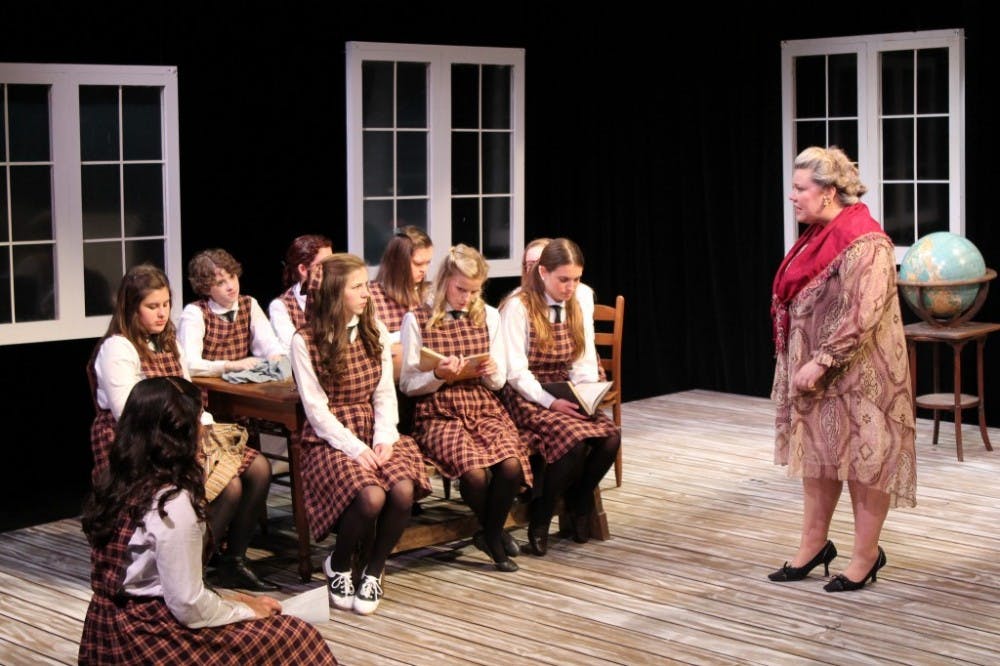Elon University’s Department of Performing Arts’ production of Lillian Hellman’s “The Children’s Hour” concluded its performance with an additional quote from the playwright.
“It is not a play about lesbians,” said Kirby Wahl, associate professor of performing arts and director of “The Children’s Hour,” quoting Hellman.
“The Children’s Hour” was presented Oct. 3-9 in the Black Box Theatre of the Center for the Arts. Originally performed in 1934, the play is a classic of American realism, which explores the consequences of a boarding school student’s false accusation that two of her female teachers are secret lovers.
From the beginning, Elon performers faced the challenge of an unusually short rehearsal period. Auditions began the first night of the fall semester, which gave students only 24 days for to fully realize their characters. Despite this disadvantageous timing, Wahl said “there was a full house [on opening night] and they gave to the actors an essential energy of enthusiasm for their performance.”
However, Wahl was not the show’s original director. After inheriting his directorship, Wahl had reservations about the play’s use of homosexuality as a motif for expressing the destruction of its characters. In the play’s text, Martha, one of the accused teachers, experiences a personal downfall after coming to the self-realization that she may indeed be homosexual.
“When I read it, I thought, 'Why are we doing this?'” Wahl said. “I found it problematic, in presenting this play, to represent this as the natural course of action in someone realizing they are homosexual. It didn’t feel right to me in 2013, even if it may have seemed acceptable for audiences in 1934.”
Wahl came up with a solution to better explain to modern theatergoers that the play is not an archaic play about lesbianism, but a universal morality tale about the repercussions of a lie.
Though not a single line was altered, Wahl allowed Martha’s character to kiss Karen, the other condemned teacher, when professing her love to her — a kiss so unexpected that it caused Friday night’s audience audibly gasp. One of Karen’s lines after this confession was, “We are going to pretend like this never happened.” In allowing Martha to react to this rejection, her resulting collapse is not strictly based on her sexuality.
“I thought, 'I’m more comfortable giving her that complexity of motives' than the 1934 version, which seems very much a period piece of how it views the homosexual character as very much ‘the other,’” Wahl said.
In early production meetings, Wahl also expressed his interest in providing the audience with a definite framework of the context and period in which the original text was written.
A technical solution for defining the period came from senior and scenic designer Elliot Dodd, who created a raked stage surrounded by the furniture from other scenes in the play. When not in use, these set pieces were draped in canvas and the non-active cast members were positioned there watching the current scene unfold.
“We are reminded that only we possess the contemporary point of view,” Wahl said.
Wahl also wrote brief explanations on the play’s context for the cast to read during scene changes to enlighten the audience on the historic details of the play.
It is explained, for instance, that Lillian Hellman revised the play during the 1950s’ infamous hearings before the House of Un-American Activities Committee, before which she would eventually be summoned to testify. These hearings often resulted in the conviction of many innocent Americans who were accused of having communist loyalties.
Elon music theatre major Chris McNiff, who played Dr. Joseph Cardin, remarked on Wahl’s expressionistic touch.
“It comments more on what [the play is] really about,” McNiff said. “We talked about the historic view of homosexuality, but it’s more about the fact of what a lie can do. One person’s actions affect other people.”
Despite the datedness of the play, it has the capability to call to mind many not-so-far-gone, real-life occurrences. In 2010 Rutgers’ University student Tyler Clementi jumped from the George Washington Bridge after his roommate used a webcam to broadcast Clementi’s romantic interlude with another man. Though there is no specific lie involved in this case, it is a parallel and equally sobering reminder of the far-reaching consequences of someone else’s thoughtless actions against an innocent individual.
“It’s about the power that people have in each others' lives and the way that power may be exercised harmfully,” Wahl said.
When Hellman was called before The House of Un-American Activities Committee in 1952, she wrote a statement through her lawyer that read, “There is one principle that I do understand. I am not willing … to bring bad trouble to people who, in my past association with them, were completely innocent … I was raised in an old-fashioned American tradition and there were certain homely things that were taught to me: to try to tell the truth, not to bear false witness, not to harm my neighbor.”
http://www.youtube.com/watch?v=LKjrQ--36V0&feature=youtu.be
A preview of The Children's Hour. Video by Skyler Wahl, multimedia reporter.


